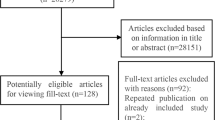Abstract
There is little doubt that statins reduce cardiovascular events more than what the lipid lowering effect can account for. Additional mechanisms have been postulated including the anti-inflammatory effects manifested by reduced C-reactive protein (CRP). It is not known, however, whether statins can decrease CRP in Chinese population. The aim of this study is to investigate the effects of statins on serum CRP in Chinese patients with coronary heart disease (CHD) or hyperlipidemia. Trials were retrieved through Medline (1980 to May, 2009), bibliographies, and the author’s reference files limited to English-language articles. Data were extracted and meta-analysis was performed. Analysis showed statistically significant reduction in CRP after statin treatment (weighted mean difference [WMD] = −0.73, 95% confidence interval [CI] = [−0.80, −0.66], P < 0.00001) and lower CRP after statin treatment than non-statin routine treatment ([WMD] = −0.52, 95% CI [−0.86, −0.18], P = 0.002). In conclusion, statins significantly reduce serum CRP in Chinese population, which may contribute to statin-induced reduction in the cardiovascular risk in addition to the lipid lowering effect.
Similar content being viewed by others
References
Ross R. Atherosclerosis: An inflammatory disease. N Engl J Med, 1999, 340: 115–126
Maseri A. Inflammation, atherosclerosis, and ischemic events: exploring the hidden side of the noon. N Engl J Med, 1997, 336: 1014–1016
Ridker P M. High-sensitivity C-reactive protein: Potential adjunct for global risk assessment in the primary prevention of cardiovascular disease. Circulation, 2001, 103: 1813–1818
Ferranti S D, Rifai N. C-reactive protein and cardiovascular disease: A review of risk prediction and interventions. Clin Chim Acta, 2002, 317: 1–15
Li J J, Fang C H. C-reactive protein is not only an inflammatory marker but also a direct cause of cardiovascular diseases. Med Hypotheses, 2004, 62: 499–506
Downs J R, Clearfield M, Weis S, et al. Primary prevention of acute coronary events with lovastatin in men and women with average cholesterol levels: Results of AFCAPS/TexCAPS. Air Force/Texas Coronary Atherosclerosis Prevention Study. JAMA, 1998, 279: 1615–1622
Sacks F M, Pfeffer M A, Moye L A, et al. The effect of pravastatin on coronary events after myocardial infarction in patients with average cholesterol levels. Cholesterol and recurrent events trial investigators. N Engl J Med, 1996, 335: 1001–1009
Shepherd J, Cobbe S M, Ford I, et al. Prevention of coronary heart disease with pravastatin in men with hypercholesterolemia. West of Scotland Coronary Prevention Study Group. N Engl J Med, 1995, 333: 1301–1307
Athyros V G, Kakafika A I, Tziomalos K, et al. Pleiotropic effects of statins—clinical evidence. Curr Pharm Des, 2009, 15: 479–489
Robinson J G, Smith B, Maheshwari N, et al. Pleiotropic effects of statins: benefit beyond cholesterol reduction? A meta-regression analysis. J Am Coll Cardiol, 2005, 46: 1855–1862
Michos E D, Blumenthal R S. Prevalence of low low-density lipoprotein cholesterol with elevated high sensitivity C-reactive protein in the US: Implications of the JUPITER (Justification for the Use of Statins in Primary Prevention: An intervention trial evaluating rosuvastatin) study. J Am Coll Cardiol, 2009, 53: 931–935
Jadad A R, Moore R A, Carroll D, et al. Assessing the quality of reports of randomized clinical trials: Is blinding necessary? Control Clin Trials, 1996, 17: 1–12
Chan K C, Chou H H, Huang C N, et al. Atorvastatin administration after percutaneous coronary intervention in patients with coronary artery disease and normal lipid profiles: Impact on plasma adiponectin level. Clin Cardiol, 2008, 31: 253–258
Zhou T, Zhou S H, Qi S S, et al. The effect of atorvastatin on serum myeloperoxidase and CRP levels in patients with acute coronary syndrome. Clin Chim Acta, 2006, 368: 168–172
Ge C J, Lu S Z, Chen Y D, et al. Synergistic effect of amlodipine and atorvastatin on blood pressure, left ventricular remodeling, and C-reactive protein in hypertensive patients with primary hypercholesterolemia. Heart Vessels, 2008, 23: 91–95
Li X, Liu C, Cui J, et al. Effects of pravastatin on the function of dendritic cells in patients with coronary heart disease. Basic Clin Pharmacol Toxicol, 2009, 104: 101–106
Yu C M, Zhang Q, Lam L, et al. Comparison of intensive and low-dose atorvastatin therapy in the reduction of carotid intimal- medial thickness in patients with coronary heart disease. Heart, 2007, 93: 933–939
Lam H C, Chu C H, Wei M C, et al. The effects of different doses of atorvastatin on plasma endothelin-1 levels in type 2 diabetic patients with dyslipidemia. Exp Biol Med, 2006, 231: 1010–1015
Qu H Y, Xiao Y W, Jiang G H, et al. Effect of atorvastatin versus rosuvastatin on levels of serum lipids, inflammatory markers and adiponectin in patients with hypercholesterolemia. Pharm Res, 2009, 26: 958–964
Yip H K, Youssef A A, Chua S, et al. Re-elevation of high-sensitivity C-reactive protein but not the von Willebrand Factor after withdrawing atorvastatin therapy in patients with unstable angina undergoing coronary artery stenting. Int Heart J, 2006, 47: 501–509
Mills E J, Wu P, Gagnier J, et al. The quality of randomized trial reporting in leading medical journals since the revised CONSORT statement. Contemp Clin Trials, 2005, 26: 480–487
Author information
Authors and Affiliations
Corresponding author
Additional information
Contributed equally to this work
About this article
Cite this article
Hao, P., Chen, Y., Wang, X. et al. A meta-analysis of the effects of statins on serum C-reactive protein in Chinese population with coronary heart disease or hyperlipidemia. Chin. Sci. Bull. 54, 4404–4410 (2009). https://doi.org/10.1007/s11434-009-0654-9
Received:
Accepted:
Published:
Issue Date:
DOI: https://doi.org/10.1007/s11434-009-0654-9




